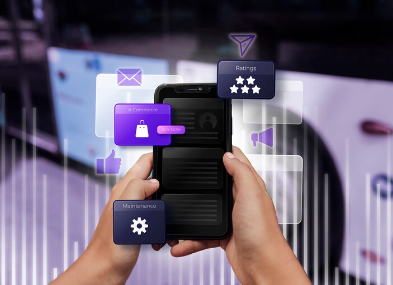Deephacks Custom App: What It Can Do for Your Brand in 2025

In the modern digital marketplace, brands are no longer judged solely by their logos or websites; they are increasingly defined by the experiences they deliver via apps, interactive tools, and immersive digital touchpoints. A Deephacks custom app offers brands a powerful opportunity to differentiate themselves by embedding intelligent automation, tailored interfaces, and advanced data-driven features into their brand ecosystem. Whether you’re a startup, a retail business, or a service provider, a well-executed Deephacks custom app can become a central pillar of your branding, customer engagement, and operational efficiency. In 2025, with consumer expectations higher than ever, delivering an app experience that resonates with your audience while aligning with your brand values becomes not just optional, but essential. This article explores what a Deephacks custom app can do for your brand—its benefits, features, use cases, implementation considerations, pitfalls to avoid, and more.
1. What Is a Deephacks Custom App & Why It Matters
A Deephacks custom app refers to a bespoke software solution built using “Deephacks” frameworks or methodologies—leveraging modular, intelligent, and scalable components tailored to your brand’s needs. Unlike off-the-shelf apps, a Deephacks custom app is built from the ground up to match your branding, processes, and goals. It may incorporate AI, automation, personalization, data integration, and unique user journeys that reflect your brand identity. The “hack” in Deephacks suggests adaptability and clever engineering—customizing systems to solve brand-specific challenges rather than shoehorning into generic templates.
Why does this matter? In a crowded digital space, your app can become a differentiator. A well-designed custom app helps you control every aspect—UX, branding, features, data flows—rather than being constrained by someone else’s framework. That control translates into better alignment with your mission, smoother customer journeys, and long-term scalability.
2. Key Features Deephacks Custom Apps Can Offer Your Brand
When crafted with intention, a Deephacks custom app can offer a wide range of sophisticated features that elevate your brand experience:
-
Tailored User Experience & Branding: The app’s visual elements, animations, transitions, tone, and layout reflect your brand identity intimately—reinforcing trust and recognition.
-
Intelligent Personalization & Content Delivery: Based on user behavior, preferences, or profile, the app can dynamically adjust content, recommendations, or UI elements.
-
Automated Workflows & Integrations: Sync your backend systems (CRM, inventory, analytics, payment gateways) into seamless flows—orders, updates, notifications—without manual work.
-
AI & Insight Engines: Use AI models for chatbots, predictive analytics, sentiment detection, image recognition, or content generation. For example, DeepSeek integration is used in building custom AI assistants in apps. momen.app
-
Secure Data Handling & Privacy Controls: With custom builds, you can ensure data encryption, role-based access, GDPR compliance, and transparent privacy settings.
-
Engagement & Gamification: Incorporate loyalty programs, rewards, challenges, badges, or social sharing to deepen user engagement.
-
Offline Functionality & Performance Optimization: Design the app to gracefully function even with intermittent connectivity, caching key data locally.
-
Scalability & Modular Upgrades: Because it’s custom-built, modules can be added, replaced, or upgraded without rewriting entire systems—future proofing your brand tech.
Each feature contributes not just functionality but also brand perception: that your brand cares about user experience, trust, relevance, and longevity.
3. Use Cases: How Brands Can Leverage Deephacks Custom Apps
To make these features more concrete, here are sample use cases where brands can leverage a Deephacks custom app advantageously:
-
Retail & E-Commerce: Build an app that blends browsing, AR-enabled try-ons, personalized product recommendations, and a one-click purchasing pipeline linked to your inventory.
-
Fitness & Wellness Brands: Create guided workout flows, nutrition tracking, AI coaches, community hubs, live classes, and progress dashboards—all under your brand umbrella.
-
Hospitality & Service Industries: Use a custom app for booking, virtual concierge, loyalty rewards, local guides, feedback loops, and upselling within your brand environment.
-
B2B & Enterprise Solutions: Internal custom apps for workforce management, client dashboards, workflow streamlining, or data visualization—tailored to your brand and operations.
-
Content & Media Brands: Deliver curated articles, multimedia, interactive stories, exclusive access tiers, and community engagement all through a branded app experience.
In each case, the custom app remains aligned with your brand values, visual identity, and customer journey, rather than relying on someone else’s template.
4. The Business Benefits & ROI for Your Brand
Investing in a Deephacks custom app can yield tangible business advantages and ROI:
-
Stronger Brand Loyalty & Stickiness: Users who adopt your branded app are more likely to stay, return, and engage regularly—building lifetime value.
-
Increased Conversions & Upsells: With direct control of user flows, reducing friction and optimizing conversion paths is easier, pushing up sales.
-
Better Customer Insights: The app can collect structured behavioral data—what features users use, drop-off points, preferences—which you can use to refine your strategy.
-
Reduced Operational Costs: Automating routine tasks (notifications, syncing, data pipelines) cuts manual labor costs and errors.
-
Competitive Differentiation: In categories where many brands offer generic apps or web portals, a custom app signals professionalism and care.
-
Scalability for Future Growth: As your brand evolves, you can adapt and expand features without complete replatforming, preserving previous investment.
Viewed strategically, the cost of building a custom app is offset by increased retention, higher customer value, and reduced technical debt over time.
5. Challenges & Critical Considerations When Building a Deephacks Custom App
Custom development is powerful—but not without challenges. Here are things your brand must consider carefully:
-
Clarify Scope & Priorities: Start with an MVP (minimum viable product) focusing on core differentiating features. Don’t try to launch everything at once.
-
User Experience & Testing: A beautifully built app is useless if it’s confusing. Rigorous UX testing, feedback loops, and iteration are essential.
-
Performance & Optimization: Custom apps can bloat if not optimized: lazy loading, efficient queries, caching, and background processing matter.
-
Security & Compliance: Handling user data demands strict encryption, secure APIs, regular audits, privacy laws (GDPR, CCPA), and secure updates.
-
Maintenance & Support: Plan for updates, bug fixes, OS version compatibility, server costs, and ongoing technical support.
-
Cost Management & Budgeting: Custom dev is more expensive than templated apps. You must balance ambition with practical budgets.
-
Vendor or In-House Expertise: Choose whether to build internally or hire a specialized team that understands Deephacks architecture and modular systems.
-
User Adoption & Marketing: Even the best app needs marketing, onboarding flows, incentives to encourage users to download and use it.
By anticipating these obstacles and planning for them, you reduce risk and improve your custom app’s success chances.
Conclusion
In 2025, a Deephacks custom app is not a luxury—it’s a strategic necessity for brands that wish to deepen engagement, personalize experiences, and stand out in a saturated marketplace. When built thoughtfully, such an app becomes an extension of your brand’s identity and mission, not just a functional tool. From tailored UIs and AI integrations to automated workflows and data insights, the features can transform how customers experience your brand. Yes, there are challenges—scope definition, security, maintenance—but with clear planning and expert execution, the rewards in loyalty, conversions, and long-term brand equity far outweigh the risks. If your brand is ready to scale into a digital future, a Deephacks custom app is one of your sharpest instruments to do so.
Frequently Asked Questions (FAQ)
Q1: What exactly is “Deephacks” in the context of custom apps?
“Deephacks” refers to frameworks or modular engineering practices where smart, efficient, hack-oriented customizations are used. In many practical situations, it may overlap with AI or intelligent system integrations that respond adaptively to brand needs.
Q2: How long does it take to build a Deephacks custom app for a brand?
Timing varies based on complexity. A modest MVP with core features might take 3–6 months; more advanced apps with AI, APIs, and integrations can take 6–12 months or more.
Q3: Will building a custom app require a large budget?
Yes, custom apps are more resource-intensive than template solutions. But budgeting smartly—focusing on core differentiators first—can manage cost. A phased development model helps.
Q4: Can existing brands (with websites) use a Deephacks custom app?
Absolutely. A custom app can complement your existing website by offering mobile-first experiences, micro-interactions, offline features, or deeper integrations not feasible via browser.
Q5: How does AI or model integration work in a Deephacks custom app?
You can integrate AI models (e.g. reasoning models like DeepSeek) to power chat, predictions, recommendations, image processing, or personalization. Some tutorials showcase how to build AI assistants using such integrations. Medium
Q6: How do I choose whether to build in-house or hire a developer/vendor?
If you have a capable tech team, in-house gives control and continuity. But vendors experienced in custom app frameworks and Deephacks architecture may deliver faster and avoid pitfalls. Always check portfolios, code quality, and long-term support.



